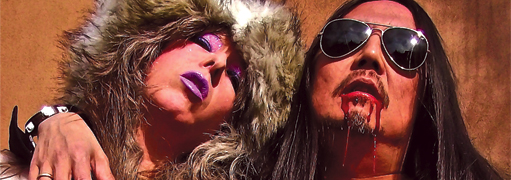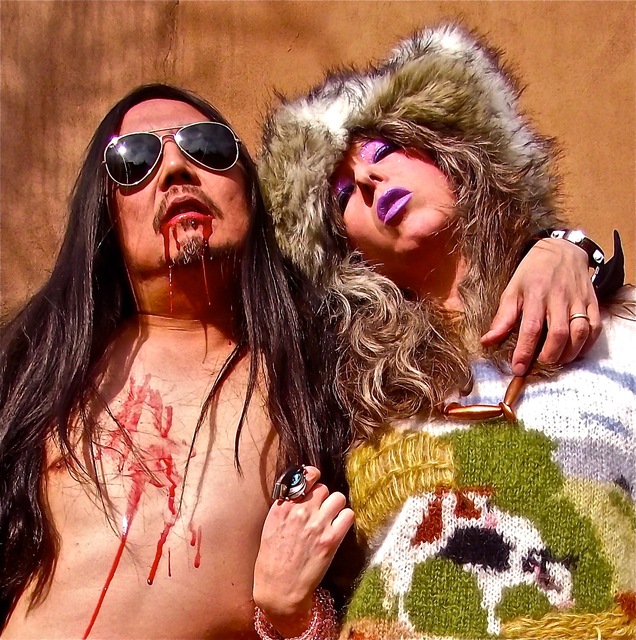Orange Man
Davis and Moritsugu’s creative partnership has evolved, culminating in what they describe as their first "smooshing together" of perspectives: a music video for indie rock innovators TV on the Radio. Theirs is one of several videos that make up a film for the album Nine Types of Light . The "aesthetic re-imagining of the record," as TVOR calls it, is up for a Grammy in the category Best Long Form Music Video.Davis, a self-deemed "fashion whore," isn’t sure yet what she’ll wear on the red carpet—probably this light purple lipstick, which she achieved earlier in the morning by combining other shades. Moritsugu says he’s heard the red carpet is actually pretty lo-fi, a tattered, nasty old thing rolled out over asphalt. The Grammys is just another stop in the longtime collaboration between the two. They met in Providence, R.I., where Moritsugu was attending Brown University and Davis was at the Rhode Island School of Design."It was statutory rape because I was only 17," Davis says."Noooooooooo. No. She was 18," Moritsugu protests."By two months. That’s gross. He was 21. He was slumming it with a freshman. I actually did stalk him." He was Orange Boy to her, because his hair was orange, he drove an orange Honda motorcycle and when he drank beer, his face got all red. She wore white makeup and had a square, black haircut. After staring at him during a party, she got his phone number and called him at 3 a.m., she says. He came over, and they chatted all night long. "It was really sweet," Moritsugu says. "Then you blew me off for four fucking years," Davis says. They laugh. Davis, a fashion illustrator, hatched a vindictive plan to draw his cartoon face on a flyer with the words "This guy’s an asshole" underneath and post them all over Providence. It never happened.Normy Hearts Punk
Moritsugu moved to San Francisco, where he found producers and investors for his flick Mod Fuck Explosion . The only star he could imagine for his movie was Davis, whom he’d used as an actress before in the film My Degeneration . He called her and told her he’d make her the next Molly Ringwald. He thought she was charismatic, magnetic. She says it was something else: "The whole energy he was picking up was me flirting with him, with the camera."Davis used her psycho aerobicizing addiction to fine-tune her figure. She wanted to fly to San Fran and break Moritsugu’s heart in 48 hours, she says. Instead, they were holding hands after only three. At the time, she was going through her "normy" period, which meant tweed and denim. "I was 25. I was grown-up. I was like, I can make grilled cheese sandwiches. I’m a grown-up." Moritsugu had a shaved head and a leather jacket, which Davis disdained at first. "I thought, he’s one of those East Village losers that can’t drop the punk rock." Before long, she chopped her hair and bleached it platinum, bought some glitter and ditched her millionaire rude boy boyfriend back in Long Island. Mod Fuck Explosion went on to win "Best Feature" at the New York Underground Film Festival in 1995. The lo-fi, subterranean, rockers-vs.-mods film with Davis as the centerpiece got a lot of press. Davis resented it. She didn’t want to be known for the movie or as Moritsugu’s girlfriend. "I said a lot of shitty things in interviews, like: Acting is for losers."But it backfired, Moritsugu chimes in, because writers loved those quotes."Now I’m so into acting," Davis says, "I’m like method. Those nerdy method fucks, I’m one of them."Abstractions and Candy
Since then, Davis has gone from Moritsugu’s muse to his co-writer and co-producer. They have their best ideas when they’re in motion or in the tub. "We’ll be taking a bath, and I’m like, Oh, you’ve got to cut meat into that scene." Long drives are helpful, too. They do all their work under their Apathy Productions company—multimedia, video, music, art, fashion styling. Moritsugu says he nearly lost his passion for filmmaking until Davis got into it. "She was the new blood and infusion of energy and ideas that I needed. By the time Scumrock came around [in 2002], I was like, I don’t know if I want to keep doing this. I’m tired of this shit." Scumrock featured Kyp Malone, who went on to become a guitarist and singer for TV on the Radio. It was Malone who called on Moritsugu and Davis to direct a video for the track "No Future Shock."The assignment is right in line with Moritsugu’s philosophy of cinema. Watching a film shouldn’t be a passive, boring event. “I want to make movies where you feel like you’re going to a show, where you leave all sweaty and freaked out and talking about it,” he says. “It should be like seeing a band instead of sitting there, checking it out, falling asleep.”For one of his first efforts in college, a nine-minute short called Mommy Mommy Where’s My Brain , he chained shut the doors of a packed auditorium right after the film started rolling. “People were like, Wow man. That’s not democratic. I was like, That’s tough. You’re in there.” That was 1986. It’s still one of his favorites. “I wanted to put something up on the screen that they’ve never seen before,” he says.“No Future Shock” is in the same vein. It’s unusual. It’s sweaty. There’s even a bit of on-the-floor daggering—a form of dancing that looks a lot like dry sex. TVOR’s Malone styled the shoot. He told Davis he wanted meek, conservative, ’50s churchgoing looks and then Cockettes-era, acid damage, drag queen fashion. Davis bought all of the outfits at Santa Fe Costumes and lugged them up to Brooklyn for the shoot. Results are gritty and fabulous, the mark of a Moritsugu-Davis collab. On his own, Moritsugu suspects he might be too abstract. And Davis likes eye-candy and cheese. "It’s a good dynamic," he says, "when we put it together."“The 54 th Annual Grammy Awards”
Airs Sunday, Feb. 12, at 8 p.m. on KRQE-13grammy.com“No Future Shock” video, directed by Amy Davis and Jon Moritsugu: bit.ly/NoFutureShock TV on the Radio’s Nine Types of Light film: bit.ly/NineTypes









